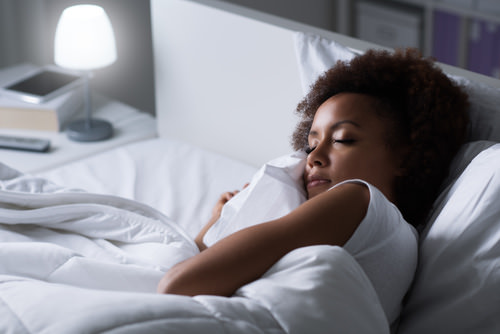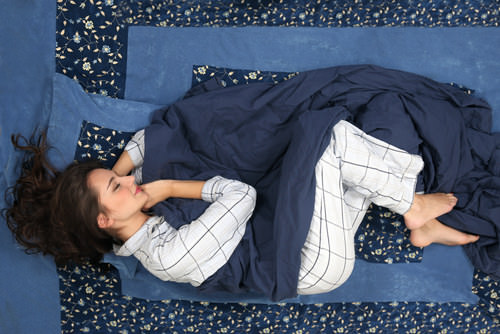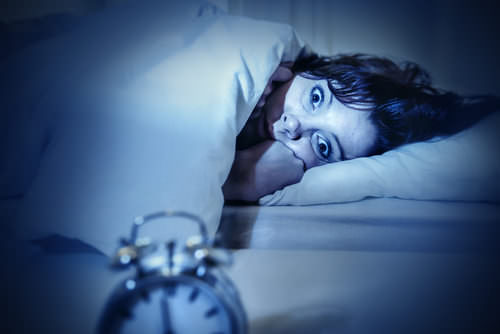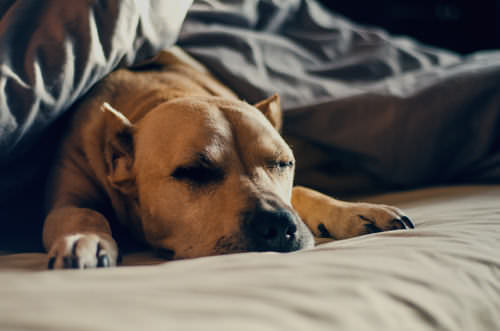
Sleep: we all do it. But while some may make the mistake of thinking sleep is a simple human function by which we restore energy, the truth is that sleep is so much more than that.
For example, did you know that the position in which you sleep is linked to your personality, or that sleep deprivation can affect the brain in the same way alcohol does? Below are 35 surprising scientific facts about sleep that are sure to make you view this necessary human function a little differently.
It is harder to sleep at higher altitudes.
According to the National Sleep Foundation, sleep disruption becomes more likely at altitudes greater than 13,200 feet. Such disruption could be the cause of lower oxygen levels, which then bring about changes in respiration. But here is some good news for those sleepy mountain dwellers: it takes only about two weeks for most people to adjust to new altitude levels.
That post-lunch dip is totally normal.
It’s completely natural to feel tired or a lag in energy at two different times of the day: 2:00 A.M. and 2:00 P.M.
The human body will never adjust to shift work.
Shift workers, or those who work long irregular hours, often experience insomnia or difficulty sleeping for the simple fact that the human body is not able to adjust to shift work. Furthermore, the International Classifications of Sleep Disorders has declared that shift workers are at increased risk for cardiovascular diseases, gastrointestinal diseases, and other chronic illnesses.
You’re hungry because you’re tired.
Your natural level of leptin, a hormone that regulates appetite, is lower when you don’t receive enough sleep. A low leptin level means a bigger appetite and decreased amounts of ghrelin, another hormone that contributes to feelings of fullness. Even worse, these low hormone levels combined with other negative effects of lack of sleep, often cause you to reach for foods that are less than healthy.
15% of the population dream in black and white.
A recent study found that 15% of dreamers dream only in black and white. Apparently, that number was much bigger — 85% — before color television found its way into every home, supporting the idea that in many ways, dreaming is like watching film. Perhaps that second statistic could help explain exactly why today’s 15% of black-and-white dreamers are mostly older people.
A giraffe can survive on only 1.9 hours of sleep per day.
For a giraffe, staying alive on the African plains is much more important than sleeping, as a giraffe can survive on fewer than two hours of sleep per 24 hours. That’s especially surprising when you consider a brown bat averages about 19.9 hours per day, a python about 18 hours, a roe deer approximately 3.09 hours, a koala 22 hours, and a human around seven to nine hours of sleep per day.
Can’t get out of bed in the morning? There’s a name for that.
We’ve all had those mornings when getting out of bed seems like the most difficult thing in the world, but for some, it actually is. Dysania is the state of finding it hard to get out of bed, and scientists seem to think it may be a form of Chronic Fatigue Syndrome.

15% of the population are sleepwalkers.
According to the National Sleep Foundation, 15% of the population sleepwalk on a regular basis. Fortunately, a related state, parasomnia, is far less common. Parasomnia refers to unnatural movements while sleeping. Such unnatural movements have included everything from sleep driving to sleep murder — so it might be worth mentioning that the National Sleep Foundation also says that it is only a myth that you shouldn’t wake a sleepwalker.
You’ll forget 50% of that amazing dream within five minutes of waking.
Forgetting half your dream within five minutes of waking up is frustrating, as is losing an additional 40% of the memory after five minutes more. The reasons for this seem more unknown than known. Sigmund Freud believed we forget our dreams so quickly because dreams are almost exclusively our repressed thoughts, while modern day scientists have suggested that dreams leave us once we start using our brains more, like we do upon waking up.
Sleep deprivation decreases pain tolerance.
While the actual scientific reasons are still mostly unknown, various studies have proven that overall tolerance to pain is dramatically decreased when the hurting person is sleep deprived.
There’s a link between a person’s personality and his or her favorite sleeping position.
A study done by Professor Chris Idzikowski of the Sleep Assessment and Advisory Service in the United Kingdom suggests that the position in which a person naturally sleeps directly relates to their personality. For example, Idzikowski’s study says that people who sleep in the fetal position “may appear tough but are actually sensitive souls right to their core,” while those who sleep on their back are “reserved” and those who sleep like a log on their sides are the social butterflies.
Certain sleep positions can aid in health.
Various studies have shown that if you’re experiencing heartburn, it may be helpful to fall asleep laying on your left side. Similarly, falling asleep on your stomach, with your hands positioned above the pillow, can help with digestion.

The wealthy sleep well at night.
Though perhaps more common sense than science, a study done by The Sleep Council in the United Kingdom showed that in general, high earners — that is, those who make more than $80,000 per year — get better sleep on a more regular basis.
Sleep deprivation can have some of the same effects as drunkenness.
After 17 straight hours of being awake, a sleep deprived person will experience the same functional deficits as a personal with a blood alcohol level of .05%. And after five nights of only partial sleep, three alcoholic drinks will affect your body in the same way that six would if you have had enough sleep.
Gamers are more likely to control their dreams.
While lots of questions still exist about this particular surprising fact, various scientific studies conducted all over the world strongly suggest that those who frequently play video games, and especially role playing video games, are more likely to be able to exert some control over their dreams.
A six-minute nap can improve your memory.
Dozens of studies have shown that people score higher on short-term memory tests after a good night’s sleep. Thus, if you want to improve your memory, it’s worth spending a little more time sleeping. Even a nap as short as six minutes can help to improve a person’s memory.
Colder temperatures can mean better sleep.
Our body temperature actually decreases slightly as we fall asleep, which is why it can be so difficult to go to bed on those hot summer nights. Studies have shown that a room with a temperature of 60-67 degrees Fahrenheit is the perfect temperature in which to fall asleep and obtain a quality night’s rest.
“Pulling an all nighter” doesn’t work.
You may already know this from experience, but when it comes to retaining information, “pulling an all nighter” just doesn’t work. In fact, staying up all night can reduce your ability to remember anything new by about 40%.
Athletes need more sleep than the average adult.
While the average adult needs seven to nine hours of sleep per night, some athletes need about 10 hours of sleep per night. These additional hours can improve an athlete’s performance, as the extra time allows the body to restore energy and even repair muscle.

A parent loses approximately 1,055.6 hours of sleep during their child’s first year.
Newborns don’t do much more than sleep, but while babies sleep an average of 14 to 17 hours per day, it is estimated that a new parent loses almost 1,056 hours in their baby’s first year of life.
That feeling you get when you jolt yourself awake is called a “hypnic jerk.”
That common feeling of literally falling as you fall asleep, only to awaken suddenly with a jerk, is called a “hypnic jerk,” or a hypnagogic. It happens during the stage of lightest sleeping, when your body has not yet entered its stage of temporary sleep paralysis.
Sexsomnia is a real thing.
About 8% of the population report having experienced “sexsomnia,” or “sleep sex,” the act of engaging in sex while not fully conscious. Scientists are still unsure about exactly what causes this bizarre behavior, though some ideas include going to bed before reaching sexual satisfaction, or dreaming about sex to the point that the body begins to act it out.
Sleep is just as important as diet and exercise.
Everyone knows a balanced diet and plenty of exercise lead to a healthy lifestyle, but the same can be said for sleep. The average adult should receive between seven and nine hours of sleep per night. In fact, sleep is so important, it is possible to die of sleep deprivation before even starvation.
Only faces you’ve seen before appear in your dreams.
While it’s possible to dream about a person you don’t actually know, it’s not possible to create a whole new face in your dreams. Also interesting: men dream about other men approximately 70% of the time, while women dream about men and women equally.

Some animals never fall asleep entirely.
A dolphin never falls asleep completely, and always has at least one half of its brain awake in order to swim. Similarly, a duck can choose to sleep with only half of its brain when it is feeling threatened by predators. Other animals link sleep and safety differently. Sea otters, for example, hold hands while asleep so they don’t drift away from one another.
That digital alarm clock is bad for your sleep.
And not just because it’s counting down the minutes until it’s time to wake up. When any kind of light exists while we are trying to sleep, even the small amount of red light on an alarm clock, important sleep chemicals needed for a good night’s rest begin to decline.
Your “natural alarm clock” is actually stress.
It turns out having a “natural alarm clock” — that is, the ability to wake up at the right time without any kind of wake-up call — is not really a good thing. According to researchers, that natural alarm clock is actually a burst of adrenocorticotropin, a stress hormone, which happens due to unconscious feelings of stress over waking up.
REM sleep could help to develop the brain.
Since the first time scientists recorded the brain during REM (rapid eye-movement) sleep in 1953, scientists have learned about dozens of things that occur during this important stage of deep sleep. In addition to being the stage in which we dream, REM could help developing brains mature, which might explain why premature babies have 75% REM sleep (compared to just 65% for babies born full term), or why newborn kittens, puppies, rats, and hamsters experience 100% REM sleep, but a newborn guinea pig, which is born much more developed, has almost no REM sleep.
It should take you 10-15 minutes to fall asleep.
According to sleep experts, falling asleep 10-15 minutes after laying down means you are just tired enough to sleep deeply, but not over tired. Falling asleep fewer than five minutes after laying down means you are sleep deprived to a certain extent.
Daylight savings time has been linked to dips in traffic accidents.
Statistics have shown that when daylight savings time ends, the extra hour of sleep most people receive is enough to lower the number of traffic accidents. It’s a well-known fact that driving while tired is dangerous. In fact, many car rental agencies make renters sign a contract that they will not drive their rented car on fewer than six hours of sleep.
It’s pretty likely that animals do indeed dream.
While scientists may never know for sure if animals dream, we have some pretty good indication that they do. In one recent study, a gorilla who knew sign language signed “sleep pictures,” which could have referred to dreaming. Of course, anyone who has ever watched their dog “running” in her sleep won’t be surprised by any of this!

Negative emotions occur more frequently in dreams than positive emotions.
Researcher Calvin S. Hall spent more than 40 years collecting and analyzing thousands of dreams. When the dreams were made public during the 1990s, they collectively revealed that the most common emotion experienced in dreams is anxiety, followed by myriad other negative emotions, and then finally, joy and happiness.
Insomnia can be deadly.
A very rare disease called Fatal Familial Insomnia (FFI) actually exists, but has only been found in about 29 families and 79 individuals worldwide. This uncommon genetic disease actually makes a person unable to fall asleep, and eventually leads to death. On average, a person can survive eighteen months after the initial onset of FFI symptoms.
Insomnia is more common in women than men.
According to the National Sleep Foundation, women are twice as likely to suffer from insomnia, perhaps having to do with female hormones. Insomnia in women has been linked to a number of hormonal changes, including menstruation, pregnancy, and menopause. It has also been suggested that this statistic helps to explain why depression is more common in women.
It’s impossible to sneeze while sleeping.
As you sleep, certain parts of your brain responsible for reacting to stimuli are relaxed. One such part that relaxes is the part that triggers the need to sneeze, and so scientists consider it impossible to sneeze during sleep.
Additional Resources on Mattress and Sleep Facts
Sources
National Sleep Foundation
Cleveland Clinic
Dreams
Valley Sleep Center
Time